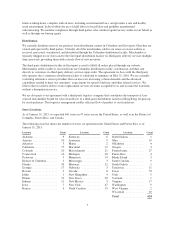Express 2014 Annual Report Download - page 21
Download and view the complete annual report
Please find page 21 of the 2014 Express annual report below. You can navigate through the pages in the report by either clicking on the pages listed below, or by using the keyword search tool below to find specific information within the annual report.We historically have received landlord allowances for store build outs, which offset certain capital expenditures
we must make to open a new store. If landlord allowances cease to be available to us in the future or are
decreased, opening new stores would require more capital outlay, which could adversely affect our ability to
continue opening new stores. To the extent we open new stores in markets where we have existing stores, our
existing stores in those markets may experience reduced net sales.
Additionally, we plan to expand our business internationally through franchise agreements, joint ventures, and
company-owned and operated stores in select markets, and these plans could be negatively impacted by a variety
of factors. We may be unable to find acceptable partners with whom we can enter into agreements, negotiate
acceptable terms for these agreements, and gain acceptance from consumers outside of the United States.
Franchise agreements also create the inherent risk as to whether such third parties are able to both effectively
operate the businesses and appropriately project our brand image in their respective markets. Ineffective or
inappropriate operation of the franchise businesses or projection of our brand image could create difficulties in
the execution of our international expansion plan.
Our domestic growth and international expansion plans will place increased demands on our financial,
operational, managerial, and administrative resources. These increased demands may cause us to operate our
business less efficiently, which in turn could cause deterioration in the performance of our existing stores.
Furthermore, relating to our international expansion, our ability to conduct business in international markets may
be affected by legal, regulatory, political, and economic risks, including our unfamiliarity with local business and
legal environments in other areas of the world. Our international expansion strategy and success could also be
adversely impacted by the global economy, as well as by fluctuations in the value of the dollar against foreign
currencies. Our planned growth will also require additional infrastructure for the development, maintenance, and
monitoring of new stores and our e-commerce business. In addition, if our current management systems and
information systems are insufficient to support this expansion, our ability to open new stores and to manage our
existing stores, e-commerce business, and franchise arrangements would be adversely affected. If we fail to
continue to improve our infrastructure, we may be unable to implement our growth strategy or maintain current
levels of operating performance in our existing stores.
We have, and will continue to have, significant lease obligations. We are subject to risks associated with
leasing substantial amounts of space, including future increases in occupancy costs and the need to generate
significant cash flow to meet our lease obligations.
We have, and will continue to have, significant lease obligations. We lease all of our store locations, our
corporate offices, and our central distribution facility. We typically occupy our stores under operating leases with
terms of ten years, with options to renew for additional multi-year periods thereafter. In the future, we may not be
able to negotiate favorable lease terms. Our inability to do so may cause our occupancy costs to be higher in
future years or may force us to close stores in desirable locations.
Some of our leases have early cancellation clauses, which permit the lease to be terminated by us or the landlord
if certain sales levels are not met in specific periods or if the center does not meet specified occupancy standards.
In addition to future minimum lease payments, some of our store leases provide for additional rental payments
based on a percentage of net sales, or “percentage rent,” if sales at the respective stores exceed specified levels,
as well as the payment of common area maintenance charges, real property insurance, and real estate taxes. Many
of our lease agreements have defined escalating rent provisions over the initial term and any extensions. As we
expand our store base, our lease expense and our cash outlays for rent under the lease terms will increase.
We depend on cash flow from operations to pay our lease expenses. If our business does not generate sufficient cash
flow from operating activities to fund these expenses, due to continued decreases in mall traffic or other factors, we
may not be able to service our lease expenses, which could materially harm our business. Furthermore, the
significant cash flow required to satisfy our obligations under the leases increases our vulnerability to adverse
changes in general economic, industry, and competitive conditions, and could limit our ability to fund working
capital, incur indebtedness, and make capital expenditures or other investments in our business.
17
























